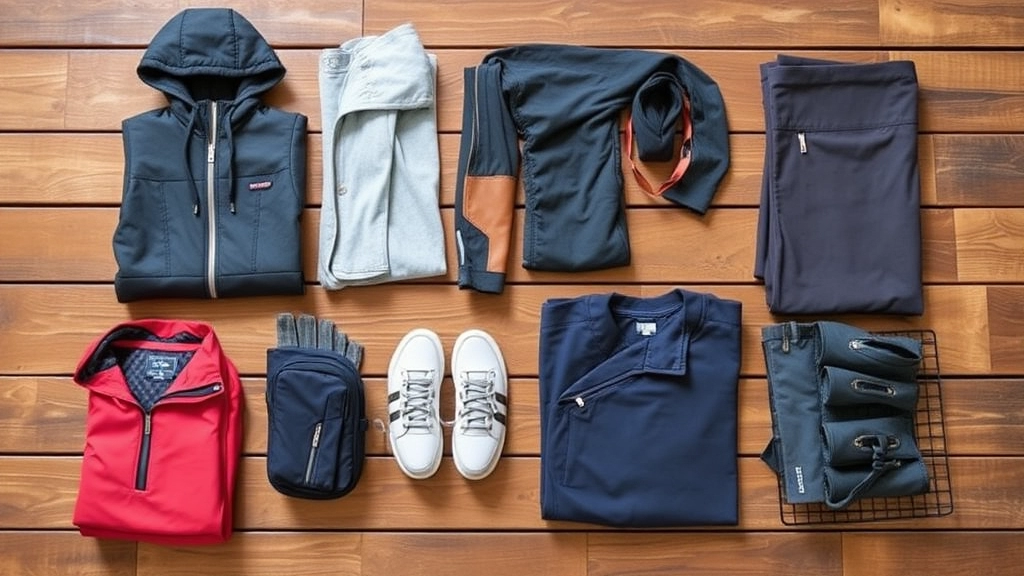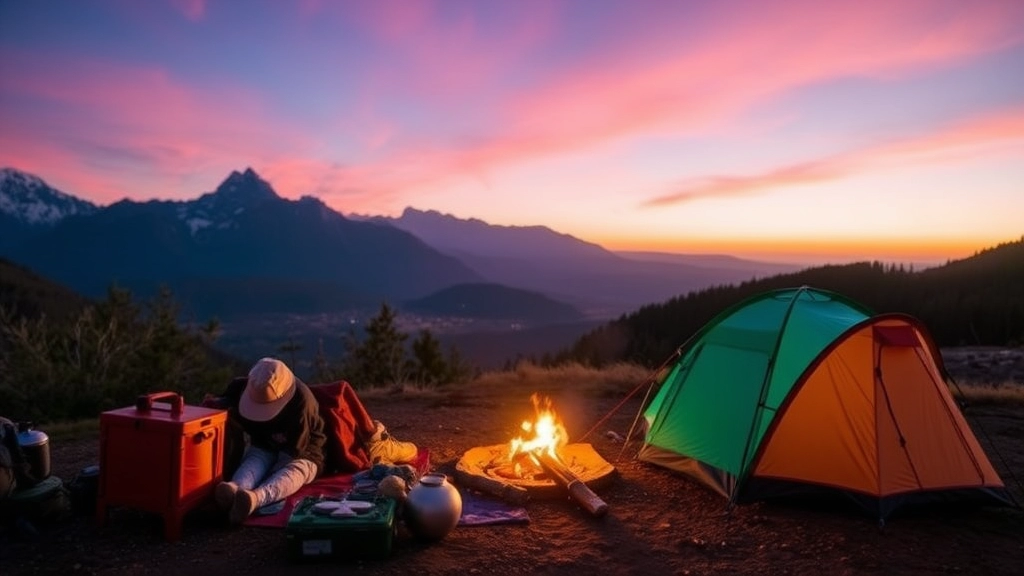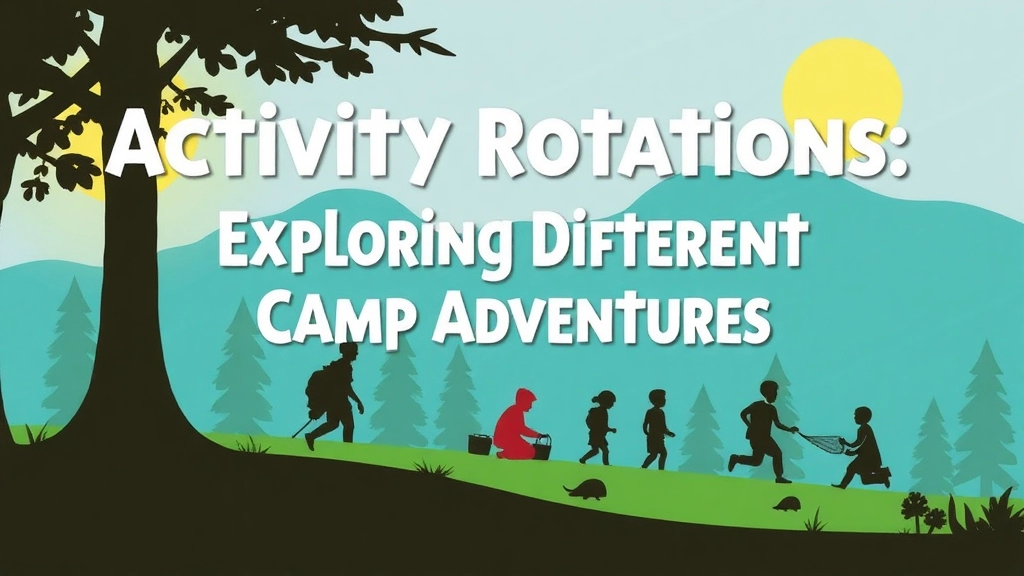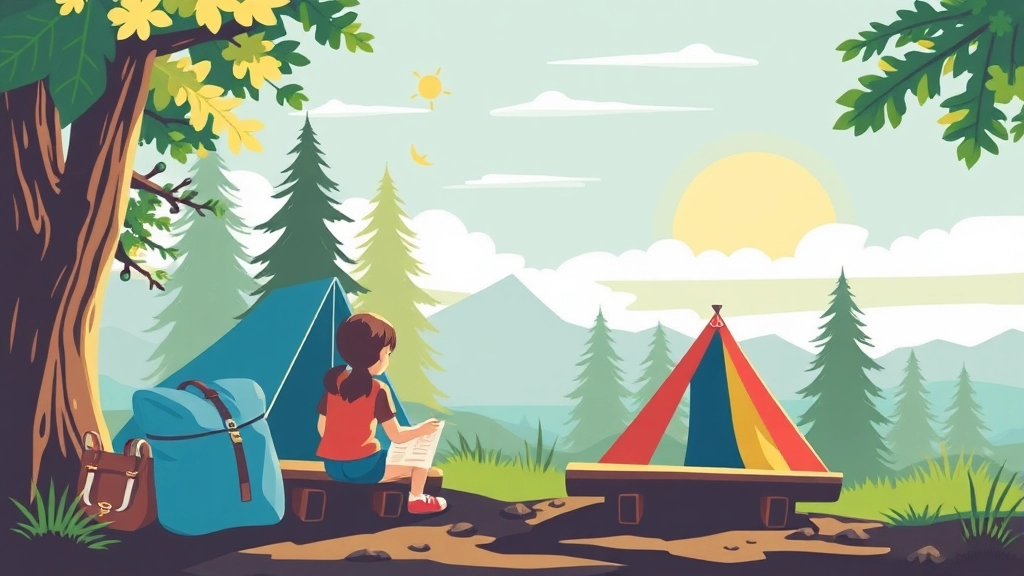Preparing for Summer Camp
Preparing for summer camp can be a thrilling yet daunting task. Whether it’s your child’s first time or they’re a seasoned camper, having a comprehensive Summer Camp Packet is essential. This guide will walk you through everything you need to know, from packing lists to health and safety measures, ensuring your camper is ready for an unforgettable experience.
What We’ll Cover
We’ll cover the must-have clothing and gear, personal care items, and camping essentials for overnight stays. Plus, we’ll dive into the daily camp schedule, activity rotations, and nutrition tips to keep your child healthy and happy. Let’s make sure you’re fully prepared for a smooth and enjoyable summer camp adventure!
Essential Packing List for Summer Camp
Alright, so you’re gearing up for summer camp. Exciting, right? But then comes the big question: what on earth do you pack? Let’s break it down and make sure you’ve got everything you need to have a blast without any last-minute panic.
What’s the Deal with Packing for Summer Camp?
First off, packing for summer camp can feel like trying to solve a puzzle with too many pieces. You want to be prepared but not lug around your entire wardrobe. So, let’s get this sorted out once and for all.
Must-Have Clothing
- T-Shirts and Shorts: You’ll need a bunch of these. Camp is all about getting dirty and having fun.
- Swimsuits: At least two. One for the pool, one for the lake.
- Sweatshirt or Light Jacket: Evenings can get chilly.
- Pyjamas: Comfortable ones, because sleep is crucial.
- Underwear and Socks: Pack enough, then add a few extra.
- Hat: For sun protection. Trust me, you don’t want to deal with sunburn.
Essential Gear
- Backpack: A sturdy one for day trips.
- Water Bottle: Hydration is key.
- Sunglasses: Protect those eyes.
- Rain Gear: A poncho or rain jacket. You never know when a summer storm will hit.
- Comfortable Shoes: One pair for hiking, one for general wear, and flip-flops for the shower.
Personal Care Items
- Toiletries: Toothbrush, toothpaste, soap, shampoo, and deodorant.
- Sunscreen and Bug Spray: Non-negotiable. You’ll thank me later.
- Towel: Quick-dry ones are the best.
- Medications: If you need them, pack them. Make sure they’re clearly labelled.
Pro Tips for Packing
- Label Everything: Seriously, everything. You don’t want your stuff to get mixed up with someone else’s.
- Pack Light: You’re there to have fun, not to carry a suitcase the size of a small car.
- Check the Camp’s Packing List: They usually provide one, and it’s a good idea to follow it.
Stories from the Campfire
I remember my first summer camp. I packed way too much and ended up wearing the same three t-shirts the entire week. Lesson learned: less is more. Another camper forgot his swimsuit and had to borrow one from the lost-and-found. Trust me, you don’t want to be that guy.
For more detailed tips on making the most of your camp experience, check out our Ultimate Summer Camp Schedule Template Guide and our Engaging Summer Camp Curriculum Guide.
Clothing and Gear: What to Wear and Bring

Alright, let’s dive into what you need to pack for summer camp.
It’s all about being prepared, right? You don’t want to be that kid who forgot their swimming trunks or extra socks.
So, what should you wear and bring? Let’s break it down.
Essential Clothing
First off, comfort is key. You’re going to be running around, swimming, hiking, and who knows what else.
Here’s your checklist:
- T-shirts: At least one for each day.
- Shorts: Same deal, one for each day.
- Swimwear: Two sets, because wet swim trunks are the worst.
- Underwear and socks: Pack extras. Trust me, you’ll need them.
- Pyjamas: Comfy ones for a good night’s sleep.
- Hat and sunglasses: Protect that face from the sun.
- Jacket or hoodie: Evenings can get chilly.
Footwear
Your feet are going to take a beating. So, you need the right shoes.
- Trainers: Good for general activities.
- Hiking boots: Essential for any long treks.
- Flip-flops or water shoes: For the pool or shower.
Gear
Now, let’s talk gear. You don’t need to bring the kitchen sink, but a few essentials can make a world of difference.
- Backpack: A small one for day trips.
- Water bottle: Stay hydrated, folks.
- Torch: Nights can be dark and full of terrors.
- Sunscreen and insect repellent: Keep your skin safe.
- Raincoat: Because weather can be unpredictable.
Personal Touches
Don’t forget the little things that make camp feel like home.
- Favourite book or journal: For some downtime.
- Camera: Capture those memories.
- Comfort item: Like a small pillow or blanket.
Real Talk
Remember, packing isn’t just about throwing stuff in a bag. It’s about being ready for anything camp throws at you.
You want to enjoy every moment, not stress over what you forgot.
So, double-check that list. And if in doubt, ask someone who’s been to camp before. They’ve got the insider scoop.
Final Thoughts
So, that’s it. Your clothing and gear essentials for summer camp.
Pack smart, stay comfy, and get ready for an epic adventure.
Personal Care Items: Staying Clean and Healthy
Alright, let’s talk about something super important when you’re heading off to summer camp: personal care items. Trust me, you don’t want to be that kid who forgot to pack their toothbrush or sunscreen. So, what exactly should you bring to stay clean and healthy?
Why Personal Care Items Matter
Ever worried about feeling grimy after a long day of camp activities? Or maybe you’re concerned about getting sunburnt or bitten by bugs? These are legit worries, and having the right personal care items can make all the difference.
The Essentials
Here’s a quick rundown of the must-haves:
- Toiletries: This includes your toothbrush, toothpaste, soap, shampoo, and conditioner. Don’t forget a hairbrush or comb!
- Sunscreen: SPF 30 or higher. Reapply every couple of hours, especially if you’re swimming or sweating a lot.
- Insect Repellent: Mosquitoes are the worst. Get a repellent with DEET for maximum protection.
- Towels: One for the shower and one for swimming.
- Lip Balm: Chapped lips are no fun. Make sure it has SPF too.
- Deodorant: Because no one wants to smell bad.
Optional but Useful
- Face Wash: If you’re prone to breakouts or just want to keep your face fresh.
- Hand Sanitiser: For those times when soap and water aren’t available.
- Wet Wipes: Great for a quick clean-up when you’re on the go.
- Nail Clippers: Hangnails can be a pain.
Staying Organised
Keep all your personal care items in a toiletry bag. It makes it easier to carry everything to the bathroom and keeps your stuff from getting lost. For more tips on packing, check out our Summer Camp Packing List Essentials.
Real Talk: Stories from Camp
I remember my first summer camp. I thought I’d packed everything, but I forgot my sunscreen. Big mistake. I ended up with a nasty sunburn that made the rest of the week pretty uncomfortable. Lesson learned: always double-check your list! If you’re looking for more ways to save on your camp essentials, don’t miss our guide on saving on summer camps with Dependent Care FSA.
Camping Gear for Overnight Excursions

Ever found yourself stressing about what gear to pack for an overnight camp?
Yeah, me too.
Let’s break it down so you’re not stuck in the middle of nowhere without your essentials.
The Must-Haves
First things first, you need the basics.
- Sleeping Bag: Look for one that’s lightweight but warm. You don’t want to freeze your butt off at night.
- Tent: If you’re sharing, make sure it’s spacious enough. No one likes being squished like sardines.
- Sleeping Mat: Trust me, the ground is not as comfy as it looks. A good mat can save your back.
Clothing Essentials
You’ll want to pack smart. Here’s a quick list:
- Waterproof Jacket: Because rain happens.
- Thermal Layers: Nights can get chilly.
- Hiking Boots: Your feet will thank you.
- Extra Socks and Underwear: Always pack more than you think you need.
Cooking Gear
Nothing beats a hot meal after a day of hiking.
- Portable Stove: Lightweight and easy to use.
- Cooking Pot: One good pot is all you need.
- Utensils: Fork, knife, spoon. Keep it simple.
- Reusable Water Bottle: Hydration is key.
Safety Gear
Don’t skimp on safety.
- First Aid Kit: You never know when you’ll need it.
- Headlamp: For those midnight bathroom trips.
- Multi-tool: Handy for all sorts of situations.
- Map and Compass: GPS is great, but batteries die.
Personal Stories
I remember my first overnight camp. Forgot my sleeping mat. Worst. Night. Ever.
Learn from my mistake. Pack smart.
Got any packing tips or horror stories?
Share them below!
Keep it real, keep it fresh, and enjoy your adventure.
Health and Safety Guidelines for Campers
Alright, let’s talk about something crucial: Health and Safety Guidelines for Campers. I know, it might not be the most exciting topic, but trust me, it’s essential. Imagine sending your kid off to camp and worrying about their well-being. Nobody wants that. So, let’s break it down and keep things straightforward.
Common Concerns: What Parents Worry About
Parents often ask:
- “Will my child be safe?”
- “What if they get sick?”
- “How are emergencies handled?”
These are valid questions. Let’s dive into the nitty-gritty and put those worries to rest.
Basic Health and Safety Rules
First things first, every camper needs to know the basics. Here are some ground rules:
- Stay Hydrated: Drink water regularly. Dehydration can sneak up, especially in the summer heat.
- Sunscreen and Hats: Sunburns are no joke. Apply sunscreen and wear hats.
- Buddy System: Always stick with a buddy. It’s safer and more fun!
Emergency Protocols
Emergencies can happen, but being prepared makes all the difference. Here’s how we handle them:
- First Aid Kits: Every camp area is equipped with fully stocked first aid kits.
- Trained Staff: Our staff is trained in basic first aid and CPR.
- Emergency Contacts: We have a list of emergency contacts for every camper, so you can be reached immediately if needed.
Health Checks
We do routine health checks to catch any issues early:
- Daily Health Screenings: Quick checks every morning to ensure everyone feels good.
- Medication Management: If your child takes medication, we handle it. Proper storage and timely administration are key.
Real-Life Example: Handling a Health Scare
Let me share a quick story. Last summer, one of the campers, Jake, started feeling dizzy during a hike. Thanks to our health checks, we caught it early. Our trained staff quickly provided water and a cool place to rest. We contacted his parents, kept them in the loop, and within an hour, Jake was back on his feet, ready to join his friends. No drama, just efficient care.
Safety Drills
We conduct regular safety drills to ensure everyone knows what to do in case of:
- Fire: Evacuation routes are clear and everyone knows the meeting point.
- Severe Weather: Safe shelters are designated, and drills are practised.
Mental Health Support
Physical health is important, but so is mental well-being. Here’s what we do:
- Counsellors Available: Trained counsellors are always on hand to talk to any camper feeling homesick or anxious.
- Quiet Zones: Designated areas where campers can relax and decompress if they need some alone time.
If you’re looking for a camp that prioritizes safety while ensuring a fun experience, check out our Widefield Summer Camp. For those interested in specialized camps, our Top Summer Camps for Gifted and Talented Children might be just what you need.
Medical Staff and Health Forms: Ensuring Proper Care

So, you’re sending your kiddo off to summer camp, right?
You’re probably thinking, “What if they get sick?” or “Who’s there to help if they get hurt?”
Good news: I’ve got you covered.
Meet the Medical Staff
First things first, camps have medical staff on hand.
These aren’t just any random folks.
We’re talking qualified nurses and sometimes even doctors.
They’re there 24/7.
Got a scrape? They’ve got a plaster.
Feeling queasy? They’ve got the meds.
Health Forms: Why Bother?
Now, let’s chat about those pesky health forms.
Yes, they’re a pain to fill out.
But they’re crucial.
Here’s why:
- Allergies: If your kid’s allergic to peanuts, the camp needs to know.
- Medications: Daily meds? They’ll make sure your child gets them.
- Emergency Contacts: In case something serious happens, they need to call you.
Real Stories, Real Care
Picture this: Sarah, a camper, had asthma.
One day, she had an attack.
Thanks to her health form, the staff knew exactly what to do.
They had her inhaler ready and called her mum immediately.
Crisis averted.
What You Need to Do
Alright, let’s break it down.
Here’s your checklist:
- Fill out the health form completely. Don’t skip sections.
- List all allergies and medications. Be specific.
- Include emergency contacts. Double-check the numbers.
Daily Camp Schedule: A Typical Day for Campers
Ever wondered what a typical day at summer camp looks like? Let’s dive right in and break it down. This is the part where you get to see what really goes on. Spoiler alert: it’s packed with fun, learning, and a whole lot of adventure.
Morning Routine: Kickstart the Day
First up, mornings at camp are all about setting the tone. Here’s how we usually roll:
- Wake-Up Call: Bright and early, usually around 7 AM. No snoozing here!
- Morning Stretch/Exercise: Think light yoga or a quick jog. It gets everyone energised.
- Breakfast: A hearty meal to fuel up. Eggs, toast, cereal – you name it, we got it.
Activity Blocks: Dive into Camp Adventures
After breakfast, it’s time to jump into the day’s activities. This is where the magic happens.
- First Activity Block: From 9 AM to 11 AM, campers split into groups and tackle different adventures. Could be canoeing, arts and crafts, or even a nature hike.
- Snack Break: Gotta refuel! A quick 15-minute break with fruits, nuts, or granola bars.
- Second Activity Block: Another round of fun from 11:15 AM to 1 PM. Maybe it’s archery this time, or learning some survival skills.
Lunch and Chill: Midday Recharge
By now, everyone’s worked up an appetite. Lunch is a big deal.
- Lunch Time: Served around 1 PM. Balanced meals with plenty of options to keep everyone happy and healthy.
- Rest Period: A bit of downtime. Campers can read, write letters home, or just relax.
Afternoon Excitement: Keep the Fun Going
Post-lunch, it’s back to the action.
- Third Activity Block: From 2:30 PM to 4 PM, more activities await. Swimming, team sports, or maybe a creative workshop.
- Free Time: A chance for campers to choose their own adventure. Play games, explore, or hang out with new friends.
Evening Wind-Down: Wrapping Up the Day
As the day winds down, we shift gears a bit.
- Dinner: Served around 6 PM. Think BBQ nights, pasta, salads – all the good stuff.
- Evening Program: From 7 PM to 9 PM, it’s time for campfires, talent shows, or stargazing. This is where some of the best memories are made.
- Lights Out: By 10 PM, it’s time to hit the sack. Rest up for another epic day ahead.
Real Talk: Why This Schedule Works
Now, you might be wondering why we stick to such a structured schedule. Here’s the deal:
- Balance: We mix active and creative activities to keep things interesting.
- Routine: A predictable schedule helps campers feel secure and know what’s coming next.
- Community: Shared meals and group activities build bonds and friendships.
For more tips on making the most of your camp experience, check out our guide to top summer camp games and activities. And if you’re curious about the costs involved, our detailed breakdown of summer camp costs will give you all the insights you need.
Activity Rotations: Exploring Different Camp Adventures

Ever felt that rush of excitement when you try something new?
At summer camp, every day is an adventure.
Activity rotations are the heart of the camp experience.
Why are they so important?
Because they keep things fresh and exciting.
What’s on the agenda?
Let me break it down for you.
Morning Madness: Wake Up and Get Moving
First thing in the morning, we’re all about getting the blood pumping.
- Nature Hikes: Ever wondered what it’s like to be one with nature? We hit the trails, spot wildlife, and learn about the environment.
- Team Sports: Football, cricket, or rounders – we’ve got it all. It’s all about teamwork and having a laugh.
Mid-Morning Magic: Learn Something New
After the morning rush, it’s time to switch gears.
- Arts and Crafts: Ever tried making a friendship bracelet? Or painting a masterpiece? This is your time to get creative.
- Science Experiments: Think you can make a volcano erupt? Or create a mini-rocket? Let’s find out.
Lunch Break: Refuel and Recharge
Lunch isn’t just about eating.
It’s a chance to share stories from the morning and plan for the afternoon.
Afternoon Adventures: Dive into Fun
Post-lunch, we dive into more activities.
- Water Sports: Canoeing, kayaking, or a good old-fashioned swim. Perfect for cooling off.
- Climbing and Ropes Courses: Ever climbed a wall or balanced on a high rope? It’s all about challenging yourself.
Evening Excitement: Wind Down with Fun
As the day winds down, we keep the fun going.
- Campfire Stories: Ever heard a ghost story under the stars? Or shared your day’s highlights around the fire?
- Talent Shows: Got a hidden talent? This is your time to shine.
Activity rotations ensure every camper gets a taste of everything.
No boredom, no monotony.
Just pure, unadulterated fun.
Why does this matter?
Because variety is the spice of life.
And at camp, we make sure every day is a new adventure.
So, are you ready to dive into the world of activity rotations?
Because trust me, it’s going to be a blast.
Nutrition at Camp: Meal Times and Healthy Eating
Ever wondered how to keep your kids well-fed and healthy at summer camp? I get it. It’s a big worry for many parents. You want to make sure they’re not just munching on snacks all day but getting real, nutritious meals. So, let’s break it down.
Real Food, Real Energy
First off, let’s talk about meal times. Camps usually have a structured schedule to keep things running smoothly. Here’s a typical day:
- Breakfast: Usually around 8 AM
- Lunch: Around noon
- Dinner: Around 6 PM
- Snacks: Mid-morning and mid-afternoon
These meals aren’t just about filling up; they’re about fuelling up. Kids are super active at camp, so the food needs to keep up with their energy levels.
What’s on the Menu?
You might be wondering, what exactly are they eating? Let’s dive into the nitty-gritty:
- Breakfast: Think cereals, fruits, eggs, and maybe some toast. It’s all about starting the day with a bang.
- Lunch: Sandwiches, salads, maybe some pasta. Easy to eat but packed with nutrients.
- Dinner: This could be anything from grilled chicken to veggie stir-fry. The goal is a balanced meal with proteins, carbs, and veggies.
- Snacks: Fruits, granola bars, maybe some yoghurt. Just enough to keep them going without spoiling their appetite.
Healthy Eating Habits
Now, let’s talk about healthy eating habits. Camps often focus on teaching kids to make good food choices. Here are a few ways they do that:
- Portion Control: Kids learn to take what they can eat and not waste food.
- Variety: They get exposed to different foods, which is great for picky eaters.
- Hydration: Water is always available, and kids are encouraged to drink plenty, especially in the summer heat.
Special Diets and Allergies
Got a kid with food allergies or special dietary needs? Camps are usually well-prepared for this. They’ll ask for this info upfront and have plans in place to handle it. Here’s how they manage:
- Labelled Meals: Special meals are clearly labelled and prepared separately.
- Trained Staff: Staff are trained to handle food allergies and know what to do in case of an emergency.
- Communication: They keep open lines of communication with parents about any concerns.
Real Stories, Real Solutions
I remember one camp where a kid named Jake had a severe peanut allergy. The camp staff were on it. They had a strict no-peanut policy, and Jake’s meals were always prepared separately. His mum was worried sick at first, but by the end of the camp, she was amazed at how well they handled it. Jake had a blast and stayed safe.
For more information on how camps ensure nutritious and balanced meals, check out our article on summer camp meal ideas. If you’re curious about how camps manage food allergies and special diets, our comprehensive guide to special needs summer camps has all the details you need.
Camp Policies: Drop-Off, Pick-Up, and Safety Regulations
Ever felt that sinking feeling in your gut when it comes to dropping off your kid at camp?
You’re not alone.
Let’s break down the essentials of camp policies, from drop-off to pick-up, and everything in between.
Drop-Off: Making It Smooth and Stress-Free
First things first, drop-off. It’s hectic, but it doesn’t have to be.
Here’s how to nail it:
- Time Windows: Camps usually have specific drop-off times. Stick to them.
- Location: Know exactly where to go. Map it out the night before.
- Quick Goodbyes: Keep it short and sweet. Long goodbyes = more anxiety.
Pick-Up: Ensuring a Safe Return
Now, let’s talk pick-up.
You want to make sure your kid gets back to you safe and sound, right?
- ID Checks: Most camps will require you to show ID. Don’t forget it.
- Authorized Pick-Ups: Only people on the approved list can pick up your child. Double-check who’s on it.
- Timing: Be punctual. Late pick-ups can mess up the camp’s schedule and stress out the staff.
Safety Regulations: Keeping Everyone Secure
Safety is non-negotiable.
Here’s how camps keep your kids safe:
- Staff Training: All staff are trained in first aid and emergency procedures.
- Emergency Plans: Camps have plans for everything from minor injuries to major emergencies.
- Supervision: Kids are never left unsupervised. Ratios of staff to campers are strictly maintained.
Real Concerns, Real Solutions
Worried about your kid’s safety at camp?
So was I.
But seeing the stringent safety regulations and how seriously camps take them put my mind at ease.
For more detailed guidance on what to expect, check out our ultimate guide to summer camping essentials.
FAQs about the Summer Camp Packet
What clothing should my child pack for summer camp?
Your child should pack comfortable clothing suitable for various activities. This includes T-shirts, shorts, swimwear, underwear, socks, pyjamas, a hat, sunglasses, and a jacket or hoodie for chilly evenings.
What type of footwear is recommended for summer camp?
It’s important to pack the right shoes, such as trainers for general activities, hiking boots for treks, and flip-flops or water shoes for the pool or shower.
What gear is essential for summer camp?
Essential gear includes a small backpack for day trips, a water bottle, a torch, sunscreen, insect repellent, and a raincoat. Personal touches like a favorite book, camera, or comfort item can also be packed.
What should I pack for an overnight camp?
For overnight camps, pack a lightweight but warm sleeping bag, a spacious tent, a sleeping mat, a waterproof jacket, thermal layers, hiking boots, and extra socks and underwear. Cooking gear like a portable stove and safety gear like a first aid kit are also essential.
Who will provide medical care at the camp?
Camps have qualified medical staff, including nurses and sometimes doctors, available 24/7 to handle any health issues that may arise.
Why are health forms necessary for camp?
Health forms are crucial as they provide information on allergies, medications, and emergency contacts. This ensures that the camp staff can provide proper care and respond quickly in case of an emergency.
What activities can my child expect at camp?
Camp activities are diverse and include nature hikes, team sports, arts and crafts, science experiments, water sports, climbing and ropes courses, campfire stories, and talent shows. These activities are designed to keep things fresh and exciting.
How does the camp ensure variety in activities?
The camp uses activity rotations to ensure that every camper gets to experience a wide range of activities, preventing boredom and keeping the experience engaging and fun.
References
-
REI: Kids Summer Camp Packing List
-
Backpacker: Gear Checklist for an Overnight Backpacking Trip
-
American Camp Association: The Importance of Health Forms at Summer Camp

